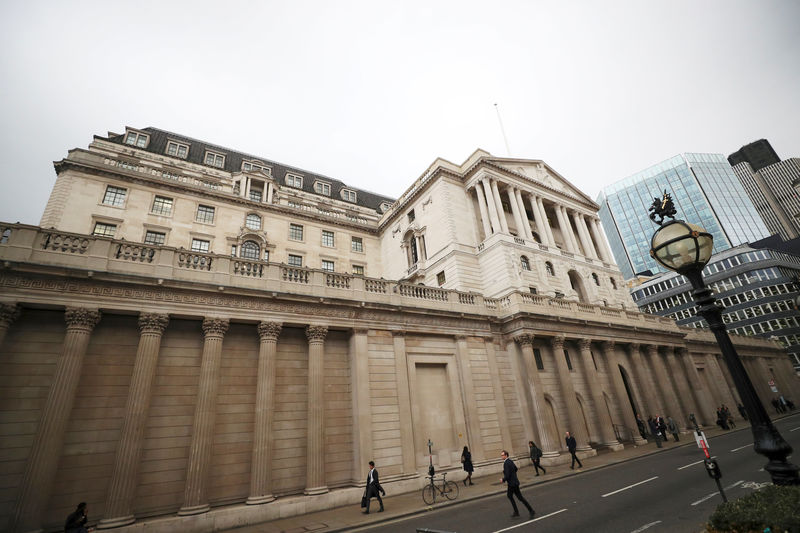 © Reuters. Bank of England mustn’t dally over next rate hike: McCafferty
© Reuters. Bank of England mustn’t dally over next rate hike: McCaffertyBy William Schomberg and David Milliken
LONDON (Reuters) – The Bank of England should not delay raising interest rates again, one of its top policymakers said, pointing to the possibility of faster pay rises and the recent strong pick-up in the world economy.
Ian McCafferty told Reuters that after lagging behind inflation for much of the past decade, wage growth might prove stronger than most of his colleagues thought, adding to pressure on inflation that is running above the BoE’s target.
“We shouldn’t dally when it comes to tightening policy modestly,” McCafferty, one of two members of the nine-strong Monetary Policy Committee who voted for a rate rise last month, said in an interview.
The BoE raised rates for the first time in more than a decade in November, saying that Britain, while growing more slowly than other rich countries because of the impact of the 2016 Brexit vote, was more prone to inflation than in the past.
Three months later, in February, the BoE said it would probably need to raise rates a bit earlier and by somewhat more than it had previously signaled, pushing up the value of sterling and leaving investors betting on a rate hike in May.
McCafferty said he could not be certain about whether to vote again for a rate rise until May’s policy meeting, but there had been no data or Brexit developments so far to make him think he was wrong in March to vote to raise rates to 0.75 percent.
The former chief economic adviser to the Confederation of British Industry has been in the minority of BoE policymakers pushing for a rate hike previously in the past four years.
Speaking in his office in the BoE on Monday, adorned with books on the economy and a framed page of The Times newspaper with a headline about inflation, McCafferty said that as well as the boost from the world economy’s strong recovery, he thought there was now no slack left in Britain’s labor market.
Unemployment at its lowest rate since 1975, skill shortages and signs that employers were resorting to higher wage offers to lure staff from rival firms or stop them from leaving would also create inflation pressure.
“It’s not wages suddenly bursting away, but it gives you a modest upside risk,” said McCafferty, whose term at the central bank ends in August.
And the “jury is still out” on whether the inflationary hit from the fall in the value of the pound after the Brexit vote in 2016 would fade as quickly as expected, he said.
“On balance, those three arguments give me some potential modest upside risks to the (inflation) forecasts,” McCafferty said.
While the BoE had been wrong in the past about wages finally gaining momentum, labor market surveys so far this year showed that the recent recovery in the headline rate of growth of pay to nearly 3 percent looked more sustainable this time, he said.
BREXIT LANDSCAPE
Often called one of the BoE’s most hawkish policymakers, McCafferty said there had been a case for following up November’s rate move with another hike as early as February.
But he held off to avoid surprising households who had been told by the BoE that it plans to raise rates only gradually.
McCafferty said he did not think the BoE should provide more detailed guidance on the future level of rates, such as the individual forecasts given by U.S. central bankers.
“My worry as a forecaster always has been that when we make a forecast it is taken as absolute certainty, gospel truth,” he said.
Typically the BoE indicates its thinking by giving forecasts for inflation based on rates staying unchanged and based on the path expected by financial markets. If the BoE forecasts above-target inflation, that shows rates may need to rise.
Last month Gertjan Vlieghe, a fellow MPC member, was unusually specific when he said he expected rates to rise by 0.25-0.50 percentage points a year for the next three years.
On Brexit, McCafferty said British exporters remained in “a sweet spot”, helped by the weakness of the pound while concerns that they might lose business with supply chain customers elsewhere in the EU had so far proven overdone.
But there were signs that British companies were wary about making long-term investments, and potential Brexit stumbling blocks would remain, he said.
“That’s going to be a permanent feature of the landscape,” McCafferty said.
Source: Investing.com




























